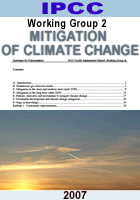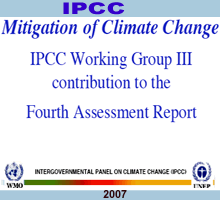| Berichte über den Klimawandel - Globale Berichte |
 |
IPCC-Bericht
zum globalen Klimawandel |
 |
IPCC Fourth Assessment Report |
|
 |
Klima Informationen |
|
|
|
Intergovernmental
Panel on Climate Change Fourth Assessment Report
|
 |
| Climate Change Impacts, Adaptation and Vulnerability |
| Mitigation |
 |
May
2007, Working Group III Contribution
The
scientific, technological, environmental, economic and social aspects of
mitigation of climate change
top
| B.
Greenhouse gas emission trends |
 |
2. Global greenhouse gas (GHG) emissions have grown since pre-industrial times,
with an increase of 70% between 1970 and 2004 (high agreement, much evidence).
 Since pre-industrial times, increasing emissions of GHGs due to human activities
have led to a marked increase in atmospheric GHG concentrations. Since pre-industrial times, increasing emissions of GHGs due to human activities
have led to a marked increase in atmospheric GHG concentrations.
 Between 1970 and 2004, global emissions of CO2, CH4, N2O, HFCs, PFCs and
SF6, weighted by their global warming potential (GWP), have increased by
70% (24% between 1990 and 2004), from 28.7 to 49 Gigatonnes of carbon dioxide
equivalents (GtCO2-eq). Between 1970 and 2004, global emissions of CO2, CH4, N2O, HFCs, PFCs and
SF6, weighted by their global warming potential (GWP), have increased by
70% (24% between 1990 and 2004), from 28.7 to 49 Gigatonnes of carbon dioxide
equivalents (GtCO2-eq).
The
emissions of these gases have increased at different rates. CO2 emissions
have grown between 1970 and 2004 by about 80% (28% between 1990 and 2004)
and represented 77% of total anthropogenic GHG emissions in 2004.
 The largest growth in global GHG emissions between 1970 and 2004 has come
from the energy supply sector (an increase of 145%). The growth in direct
emissions in this period from transport was 120%, industry 65% and land
use, land use change, and forestry 40%. Between 1970 and 1990 direct emissions
from agriculture grew by 27% and from buildings by 26%, and the latter
remained at approximately at 1990 levels thereafter. However, the buildings
sector has a high level of electricity use and hence the total of direct
and indirect emissions in this sector is much higher (75%) than direct
emissions. The largest growth in global GHG emissions between 1970 and 2004 has come
from the energy supply sector (an increase of 145%). The growth in direct
emissions in this period from transport was 120%, industry 65% and land
use, land use change, and forestry 40%. Between 1970 and 1990 direct emissions
from agriculture grew by 27% and from buildings by 26%, and the latter
remained at approximately at 1990 levels thereafter. However, the buildings
sector has a high level of electricity use and hence the total of direct
and indirect emissions in this sector is much higher (75%) than direct
emissions.
 The effect on global emissions of the decrease in global energy intensity
(-33%) during 1970 to 2004 has been smaller than the combined effect of
global income growth (77 %) and global population growth (69%); both drivers
of increasing energy-related CO2 emissions. The effect on global emissions of the decrease in global energy intensity
(-33%) during 1970 to 2004 has been smaller than the combined effect of
global income growth (77 %) and global population growth (69%); both drivers
of increasing energy-related CO2 emissions.
The
long-term trend of a declining carbon intensity of energy supply reversed
after 2000. Differences in terms of per capita income, per capita emissions,
and energy intensity among countries remain significant.
In
2004 UNFCCC Annex I countries held a 20% share in world population, produced
57% of world Gross Domestic Product (GDP) based on Purchasing Power Parity
(PPP), and accounted for 46% of global GHG emissions.
 The emissions of ozone depleting substances (ODS) controlled under the
Montreal Protocol, which are also GHGs, have declined significantly since
the 1990s. By 2004 the emissions of these gases were about 20% of their
1990 level. The emissions of ozone depleting substances (ODS) controlled under the
Montreal Protocol, which are also GHGs, have declined significantly since
the 1990s. By 2004 the emissions of these gases were about 20% of their
1990 level.
 A range of policies, including those on climate change, energy security,
and sustainable development, have been effective in reducing GHG emissions
in different sectors and many countries. The scale of such measures, however,
has not yet been large enough to counteract the global growth in emissions. A range of policies, including those on climate change, energy security,
and sustainable development, have been effective in reducing GHG emissions
in different sectors and many countries. The scale of such measures, however,
has not yet been large enough to counteract the global growth in emissions.
3. With current climate change mitigation policies and related sustainable
development practices, global GHG emissions will continue to grow over
the next few decades (high agreement, much evidence).
 The SRES (non-mitigation) scenarios project an increase of baseline global
GHG emissions by a range of 9.7 GtCO2-eq to 36.7 GtCO2-eq (25-90%) between
2000 and 20309. In these scenarios, fossil fuels are projected to maintain
their dominant position in the global energy mix to 2030 and beyond. Hence
CO2 emissions between 2000 and 2030 from energy use are projected to grow
45 to 110% over that period. The SRES (non-mitigation) scenarios project an increase of baseline global
GHG emissions by a range of 9.7 GtCO2-eq to 36.7 GtCO2-eq (25-90%) between
2000 and 20309. In these scenarios, fossil fuels are projected to maintain
their dominant position in the global energy mix to 2030 and beyond. Hence
CO2 emissions between 2000 and 2030 from energy use are projected to grow
45 to 110% over that period.
Two
thirds to three quarters of this increase in energy CO2 emissions is projected
to come from non-Annex I regions, with their average per capita energy
CO2 emissions being projected to remain substantially lower (2.8-5.1 tCO2/cap)
than those in Annex I regions (9.6-15.1 tCO2/cap) by 2030. According to
SRES scenarios, their economies are projected to have a lower energy use
per unit of GDP (6.2 - 9.9 MJ/US$ GDP) than that of non-Annex I countries
(11.0 - 21.6 MJ/US$ GDP).
top
|
UNEP
Report 2007: «Global Outlook for Ice and Snow»
|
 |
| IPCC-Report
2007 |
IPCC-Report
2007 |
 |
 |
| RAOnline
Download |
 |
 |
Externe
Links |
World
Meteorological organisation WMO
United
Nations Environment Programme UNEP |
|
|

|
| IPCC-Report
2007 |
IPCC-Report
2007 |
|
 |
|
RAOnline
Download |
 |
 |
Externe
Links |
World
Meteorological organisation WMO
United
Nations Environment Programme UNEP |
|
|

|
 |
| Source:
IPCC; UNEP and WMO, 5 May 2007 |
| Links |
 |
 |
 |
Externe
Links |
| Intergovernmental
Panel on Climate Change (IPCC) IPCC |
| UN
Environment Programme (UNEP) UNEP |
|
 |
|

![]() Since pre-industrial times, increasing emissions of GHGs due to human activities
have led to a marked increase in atmospheric GHG concentrations.
Since pre-industrial times, increasing emissions of GHGs due to human activities
have led to a marked increase in atmospheric GHG concentrations.
![]() Between 1970 and 2004, global emissions of CO2, CH4, N2O, HFCs, PFCs and
SF6, weighted by their global warming potential (GWP), have increased by
70% (24% between 1990 and 2004), from 28.7 to 49 Gigatonnes of carbon dioxide
equivalents (GtCO2-eq).
Between 1970 and 2004, global emissions of CO2, CH4, N2O, HFCs, PFCs and
SF6, weighted by their global warming potential (GWP), have increased by
70% (24% between 1990 and 2004), from 28.7 to 49 Gigatonnes of carbon dioxide
equivalents (GtCO2-eq).
![]() The largest growth in global GHG emissions between 1970 and 2004 has come
from the energy supply sector (an increase of 145%). The growth in direct
emissions in this period from transport was 120%, industry 65% and land
use, land use change, and forestry 40%. Between 1970 and 1990 direct emissions
from agriculture grew by 27% and from buildings by 26%, and the latter
remained at approximately at 1990 levels thereafter. However, the buildings
sector has a high level of electricity use and hence the total of direct
and indirect emissions in this sector is much higher (75%) than direct
emissions.
The largest growth in global GHG emissions between 1970 and 2004 has come
from the energy supply sector (an increase of 145%). The growth in direct
emissions in this period from transport was 120%, industry 65% and land
use, land use change, and forestry 40%. Between 1970 and 1990 direct emissions
from agriculture grew by 27% and from buildings by 26%, and the latter
remained at approximately at 1990 levels thereafter. However, the buildings
sector has a high level of electricity use and hence the total of direct
and indirect emissions in this sector is much higher (75%) than direct
emissions.
![]() The effect on global emissions of the decrease in global energy intensity
(-33%) during 1970 to 2004 has been smaller than the combined effect of
global income growth (77 %) and global population growth (69%); both drivers
of increasing energy-related CO2 emissions.
The effect on global emissions of the decrease in global energy intensity
(-33%) during 1970 to 2004 has been smaller than the combined effect of
global income growth (77 %) and global population growth (69%); both drivers
of increasing energy-related CO2 emissions.
![]() The emissions of ozone depleting substances (ODS) controlled under the
Montreal Protocol, which are also GHGs, have declined significantly since
the 1990s. By 2004 the emissions of these gases were about 20% of their
1990 level.
The emissions of ozone depleting substances (ODS) controlled under the
Montreal Protocol, which are also GHGs, have declined significantly since
the 1990s. By 2004 the emissions of these gases were about 20% of their
1990 level.
![]() A range of policies, including those on climate change, energy security,
and sustainable development, have been effective in reducing GHG emissions
in different sectors and many countries. The scale of such measures, however,
has not yet been large enough to counteract the global growth in emissions.
A range of policies, including those on climate change, energy security,
and sustainable development, have been effective in reducing GHG emissions
in different sectors and many countries. The scale of such measures, however,
has not yet been large enough to counteract the global growth in emissions.
![]() The SRES (non-mitigation) scenarios project an increase of baseline global
GHG emissions by a range of 9.7 GtCO2-eq to 36.7 GtCO2-eq (25-90%) between
2000 and 20309. In these scenarios, fossil fuels are projected to maintain
their dominant position in the global energy mix to 2030 and beyond. Hence
CO2 emissions between 2000 and 2030 from energy use are projected to grow
45 to 110% over that period.
The SRES (non-mitigation) scenarios project an increase of baseline global
GHG emissions by a range of 9.7 GtCO2-eq to 36.7 GtCO2-eq (25-90%) between
2000 and 20309. In these scenarios, fossil fuels are projected to maintain
their dominant position in the global energy mix to 2030 and beyond. Hence
CO2 emissions between 2000 and 2030 from energy use are projected to grow
45 to 110% over that period.





